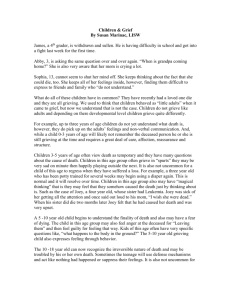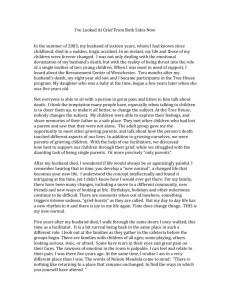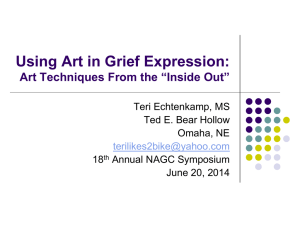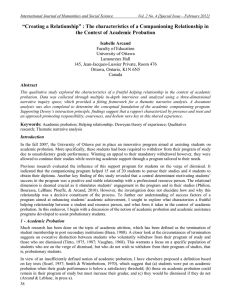Grief Matters
advertisement
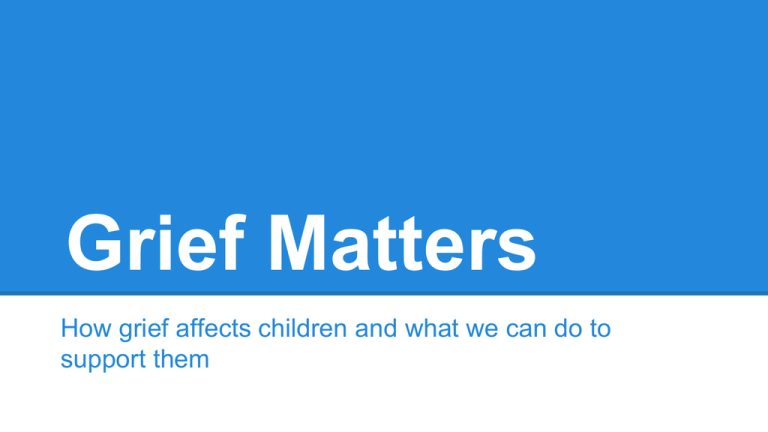
Grief Matters How grief affects children and what we can do to support them What is Grief? - Grief is the normal and natural response we experience when we lose someone or something that has had meaning in our lives. - It is what we think and feel on the inside. It is numbness, sadness, anger, guilt, relief, etc. all rolled up into one. What is Mourning? - - Mourning is the outward expression of grief. It is letting it out somehow. This may include: crying, talking, journaling, running, artwork, music, etc. Everyone grieves on the inside, but not everyone mourns. Mourning is essential in order for healing to take place. Without mourning, people can remain stuck and not live life fully. They build walls around their hearts to prevent future pain. When this happens, the loss often resurfaces later in life with more serious problems. Symptoms of Grief Grief can affect someone on various levels: ● Physical ● Emotional ● Social ● Cognitive ● Behavioral ● Spiritual Physical Symptoms ● Change in energy level (hyperactive or hypoactive) ● Physical distress (migraines, chest pain, tingling sensation in hands, lump in throat, etc.) ● Change in appetite ● Change in sleeping pattern Emotional Symptoms Denial Numbness Sadness Anger Fear Resentment Anxiety Abandonment Guilt Relief Social Aspects ● ● ● ● ● ● ● ● Overly sensitive Dependent Withdrawn Avoid others Lack of initiative Lack of interest Feel alone/ different Long to be treated as they were before Cognitive Symptoms ● ● ● ● ● ● Forgetful Inability to concentrate or focus Inability to make decisions Searching for the deceased Slowed thinking Dream of the deceased Behavioral Symptoms ● ● ● ● ● ● ● Restlessness Anger outbursts Separation Anxiety Regression in behaviors (bed wetting) May turn to drugs and alcohol to numb pain May turn to cutting to release internal pain May engage in other risk taking behaviors Spiritual Aspects ● Some may become more spiritual as they lean on their faith to help them through this difficult experience ● Some may begin to question their faith ● Some may lose their faith Grief Spiral Shock Physiological Changes Regression Disorganization/Panic Explosive Emotions Acting Out Hypermaturity Fear Guilt Relief Sadness Reconciliation Reconciliation Needs of the Mourner Alan Wolfelt 1. Acknowledge the reality of the death. 2. Move toward the pain of the loss while being nurtured physically, emotionally, and spiritually. 3. Convert the relationship with the person who died from one of presence to one of memory. 4. Develop a new self-identity based on a life without the person who died. 5. Relate the experience of death to a context of meaning. 6. Experience a continued support environment in future years. Child Development and Grief The developmental age of the child will largely impact how he or she grieves. Fred Rogers once quoted, “If you are old enough to love, you are old enough to grieve”. Birth to Pre-school Concept of Death: ● Has no concept of death. ● Sense that something has changed if main caregiver is no longer present. ● Able to sense a caregiver’s emotional distress. Birth to Pre-School Grief Issues: ● May respond to death with irritability, change in sleep, eating and play patterns ● May regress ● May search for caregiver ● May be attached to remaining caregiver and fear separation Birth to Pre-School How to support this age group: ● Provide nurturing, love and physical closeness ● Language holds special meaning at this age. Familiar voices, songs, phrases bring comfort ● Maintain a schedule/routine as much as possible ● Provide them the opportunity to play. It is through play that young children work through life’s most difficult situations. The Importance of Play “Play is often talked about as if it were a relief from serious learning. But for children, play is serious learning. At various times, play is a way to cope with life and to prepare for adulthood. Playing is a way to solve problems and to express feelings. In fact, play is the real work of children”. -Fred Rogers Three to Six Years: Concept of death: ● ● ● ● Death is often confused with sleeping Death is often looked at as temporary and reversible Death is thought of as a journey or trip Due to magical thinking that takes place at this age, the child may believe that if he or she wishes hard enough then their request will come true. ● May be interested in the physical or biological aspect of death Three to Six Years: Grief Issues: ● Young children grieve in spurts. One moment they may appear fine, the next moment they are having a melt down or sobbing in their closet. ● May ask questions repeatedly ● Changes in behaviors. Will act out inner feelings. ● Separation Anxiety. May be very attached to remaining caregiver and fear separation ● May believe they somehow caused the death Three to Six Years Old How to support this age group: ● Answer questions openly and honestly ● Use appropriate vocabulary for age ● Maintain a schedule ● Provide play opportunities ● Model/encourage appropriate expression of feelings and memory sharing ● Keep a journal of important events ● Ask child if they would like photos of loved one ● Keep in contact with school/pre-school Seven to Twelve Years Concept of Death: ● Death is sometimes thought of as ghosts ● Beginning to understand the finality of death ● May be interested in the physical and biological aspects of death ● May feel that he or she caused the death Seven to Twelve Grief Issues: ● May appear fine (not wanting to look different from peers) ● May respond to death with irritability, change in sleep, appetite ● May be concerned with who will take care of them ● May be concerned about future of self and others ● May feel stigma at school or around peers ● May be very attached to remaining caregiver ● Physical reactions and acting out behaviors Seven to Twelve Years How to support this age group: ● Answer questions openly and honestly ● Maintain a schedule ● Model and encourage appropriate expression of feelings and memory sharing ● Listen to the child: what they say, their behaviors, their silence ● Give the child choices to help regain a sense of control ● Let the child guide you as to what they need ● Keep in contact with school Teen Years Concept of Death: ● ● ● ● ● Death is final, an end to physical life Realization of own mortality Evaluates meaning of life May feel that he or she caused the death Understands future - grieves present losses as well as future losses Teens Years Grief Issues: ● May appear fine ● May feel stigma at school or around peers ● May be concerned about the future of self and others ● May attempt to take on role of deceased ● Struggles with needing support and not wanting it ● May be attached to remaining caregiver ● Most likely to express anger Teens Years How to support this age group: ● Answer questions openly and honestly ● Be available when teen wants to talk ● Do not force teens to talk - they will talk when they are ready ● Let the teen guide you as to what they need ● Model/encourage appropriate expression of feelings ● Reduce expectations when grieving ● Be patient ● Keep in contact with school The role of Companioning Dr. Alan Wolfelt, who has worked with grieving families for many years, takes the word ‘companion’ which is a noun and turns it into a verb – ‘companioning’. He believes walking alongside someone on their grief journey is the greatest gift you can give. The Tenets of Companioning the Bereaved Alan Wolfelt Tenet One: Companioning is about being present to another person’s pain, not about taking the pain away. Tenet Two: Companioning is about going to the wilderness of the soul with another human being, not about thinking you are responsible for finding the way out. Tenet Three: Companioning is about honoring the spirit, not about focusing on the intellect. Tenet Four: Companioning is about listening with the heart, not about analyzing with the head Tenet Five: Companioning is about bearing witness to the struggles of others; not about judging or directing these struggles. Tenets of Companioning (Cont.) Tenet Six: Companioning is about walking alongside, not about leading. Tenet Seven:Companioning means discovering the gifts of sacred silence, not filling up every moment with words. Tenet Eight: Companioning is about being still, not about frantic movement forward. Tenet Nine: Companioning is about respecting disorder and confusion, not about imposing order and logic. Tenet Ten: Companioning is about learning from others, not about teaching them. Tenet Eleven: Companioning is about curiosity, not about expertise. Factors to take into consideration ● Developmental Ages ● Previous Losses ● History of Mental Illness (depression, anxiety, PTSD, etc.) ● What may be triggering present crisis (anniversary, holiday, event) ● What type of support system do they have Red Flags - when to contact a professional The following symptoms/behaviors may occur. If the frequency and intensity of the symptoms/behaviors do not lessen over time, please contact a professional. ● Persisting difficulty talking about the deceased person ● Aggressive behaviors ● Anxiety ● Somatic complaints ● Sleeping difficulties ● Eating disturbances ● Marked Social Withdrawal ● Persistent Self-blame or guilt ● Self-destructive behaviors or desire to die When to contact Tides ● When there has been a death and children/teens are involved. ● When a family would benefit from resources (articles, books, locating individual and family counseling services). ● When an adult is looking for grief support (Grief Connections) Ways to help grieving children - Listen. Children may want to share their story. This is a healing experience. Do not give advice or make judgments. Reflect back to what the child says, using the child’s words. Children must feel that their physical and emotional needs are going to be met before/he can give into grieving. (If I talk, will someone listen? If I cry, will someone hold me?) - Listen some more. Sometimes children don’t want to talk, can’t find the words, or try to protect adults around them from more pain, so they choose to be silent. When you listen, pay attention to the non-verbals. - Be honest with the child. It is difficult to talk to kids about painful things because we want to protect them. It is important to be honest which brings trust and opens communication. - Answer their questions, even the hard ones. It is important for children to know that they can ask questions. Answer questions truthfully, being sensitive to their age. It is acceptable to say, “I don’t know”. - Give the child choices. This helps them regain control they feel they may have lost. Continued…. - Hug with permission. - Practice patience. - Respect grieving children even when they are in a bad mood. - Be aware some kids will regress, others will become little adults. - Eat right and drink water. - Help the child at bedtime. Consistent bedtime rituals-story, song, prayer. - Don’t force children to talk. They will talk when they are ready. - Take a break. When possible, plan fun activities for your children that will allow them to laugh, play, and be kids. - Playing is grieving. Continued….. - Encourage consistency and routine. - Talk about and remember the person who died. Bringing up the name of the person who died gives children permission to share their feelings about the person. It shows then it is not “taboo” to talk about the deceased. Sharing a memory shows the child that the person who died will continue to live on within them and impact of those left behind. - Expect and allow all kinds of emotions (both positive and negative) - Respect differences in grieving styles. - Provide hands on activities. (Drawing, journaling, painting, sculpting clay, collages, memory boxes) Exercise and physical play helps children release energy and emotion. - Be a model for your children. Children watch adults to get cues about how to grieve. It is important for children to know it is okay to cry, be angry, and to grieve. Tides Mission Tides’ mission is to provide safe and nurturing peer support programming for children, teens and their families who have experienced the death of a loved one. Tides also raises the awareness of the needs of grieving children and teens in our community. Goals of Tides The goal of Tides is to provide a safe place where grieving families can: ● Learn they are not alone ● Share feelings in a supportive setting ● Realize what they are going through is normal ● Learn that hope and healing are possible ● Form quality relationships ● Have fun Tides Night ● Tides generally meets the first and third Thursday of each month, September-May. ● Meetings are held at Houserville Elementary School. ● There is no cost for families to attend the Tides program. ● Registration is required. ● Intake process is conducted to ensure appropriateness for group setting. Timeline of Tides Night ● ● ● ● ● 5:30pm-6:00pm 6:00pm-6:30pm 6:30pm-7:30pm 7:30pm-7:45pm 7:45pm-8:15pm Pre-meeting with volunteers Families arrive, dinner served Small groups take place Large closing circle Post-meeting with volunteers Tides information Call Tides at 814-692-2233 for questions, resources or further information. Visit our website at www.tidesprogram.org Friend us on Facebook at www.facebook.com/Tidesprogram and/or follow us on Twitter at https://twitter.com/Tides_Program
